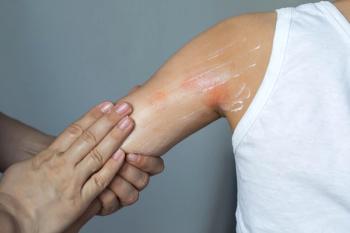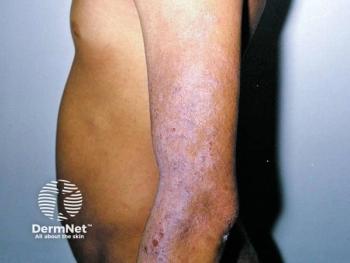
Dermasurgery complications run the gamut
Swelling around the eyes also can be a source of vague post-procedure complaints.
Troubleshooting
After undergoing botulinum toxin injections, "It's not at all uncommon for people to come in with very vague complaints such as, 'My eyes aren't right,'" says Alastair Carruthers, M.D., clinical professor of dermatology at the University of British Columbia.
He says what's much more common is weakness of the elevator of the eyebrow, which produces a drop in the eyelid.
Dr. Carruthers explains, "People are exquisitely sensitive to the position and movement of their eyebrows, as well as their eyelids. Relatively small changes of approximately 0.5 mm will be detected by the individual, but if one looks at them one really can't see them."
A patient who has pure eyelid ptosis almost invariably possesses elevation of the eyebrow on the same side, because they're attempting to raise the eyelid by raising the eyebrow, Dr. Carruthers tells Dermatology Times.
"If it's the eyebrow that's down, one must treat that. Sometimes women with droopy eyebrows will notice that they have difficulty putting their eye makeup on," he says.
Swelling around the eyes also can be a source of vague post-procedure complaints, Dr. Carruthers notes.
"We believe swelling occurs due to reduced activity in the area," he explains. "Normally the muscles are working there and pumping the normal tissue fluid out. But if one stops those muscles, a little buildup of tissue fluid occurs. Typically, if that happens, it happens only with the first botulinum toxin injection. It lasts two to four weeks, then goes away. Occasionally I've seen individuals in whom it lasts for the entire duration of the botulinum toxin injection. But mostly, it's relatively transient."
Placebos
Treating minor complications sometimes requires physicians to use saline as a placebo, Dr. Carruthers says.
"If people come in with a problem that one has created," he says, "they want one to do something. They know that botulinum toxin works slowly, because they've watched it take effect slowly."
If doing something is the only way to satisfy the patient, he says, "It may be appropriate just to put a little bit of saline in there and tell them it's going to take a week or so to resolve, but it will resolve. When one sees them a week later, usually it's gone."
Newsletter
Like what you’re reading? Subscribe to Dermatology Times for weekly updates on therapies, innovations, and real-world practice tips.












